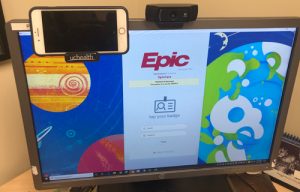
Dr. Kolfenbach uses multiple screens at his desk for telemedicine appointments and meetings with fellows and others in the rheumatology department.
“As a faculty [member], I can join into that [session] remotely, as well. Up to five people can be in the virtual room, so at any time the patient, medical assistant, medical translator, fellow and faculty member can all be engaged in clinical care with no one actually in the physical rheumatology clinic,” says Dr. Kolfenbach.
Some medical needs, such as infusions, obviously cannot be accommodated by phone or telemedicine. Clinics remain open for rheumatology patients who require in-person care. “We still see patients in person if the clinical need mandates it,” says Dr. Kolfenbach. Although visits have decreased in part because some patients cancel appointments, “our doors are not shut,” he says.
Dr. Kolfenbach sees the recent adjustments as stopgap measures to keep patients as stable as possible during the challenges of the pandemic. It’s important for rheumatology fellows to gain experience with the hands-on nature of the specialty, such as examining a patient for swollen joints.
“Our job as rheumatologists, especially in patients with inflammatory joint disease, can be heavily influenced by exam findings,” says Dr. Kolfenbach. “An exam can be performed in a telemedicine visit, but there are limitations. If the pandemic continues to keep patients away for months on end, I worry that care could be impacted for patients who miss out on the opportunity to receive a thorough physical exam.
“We all learn from doing things by repetition, and if clinical volume is down, then that’s fewer opportunities to learn how to take care of somebody who has a chronic illness,” he says. “Our program is tracking patient numbers for the fellows, and we will think of creative ways to provide more opportunities if this is sustained.”
Well-being
Adjusting to technological changes that improve safety for both patients and staff is easier to achieve compared with the ongoing effort to keep everyone feeling well physically, mentally and emotionally. The separation from ordinary, everyday interaction and routine can lead to feelings of isolation, notes Dr. Libman.
“I try to keep lines of communication open and ask how people are doing,” says Dr. Libman. “Even small talk or a brief hello can be a powerful way to connect with and support each other.”
Aside from career challenges for fellows, the pandemic takes a toll on personal lives, too.



